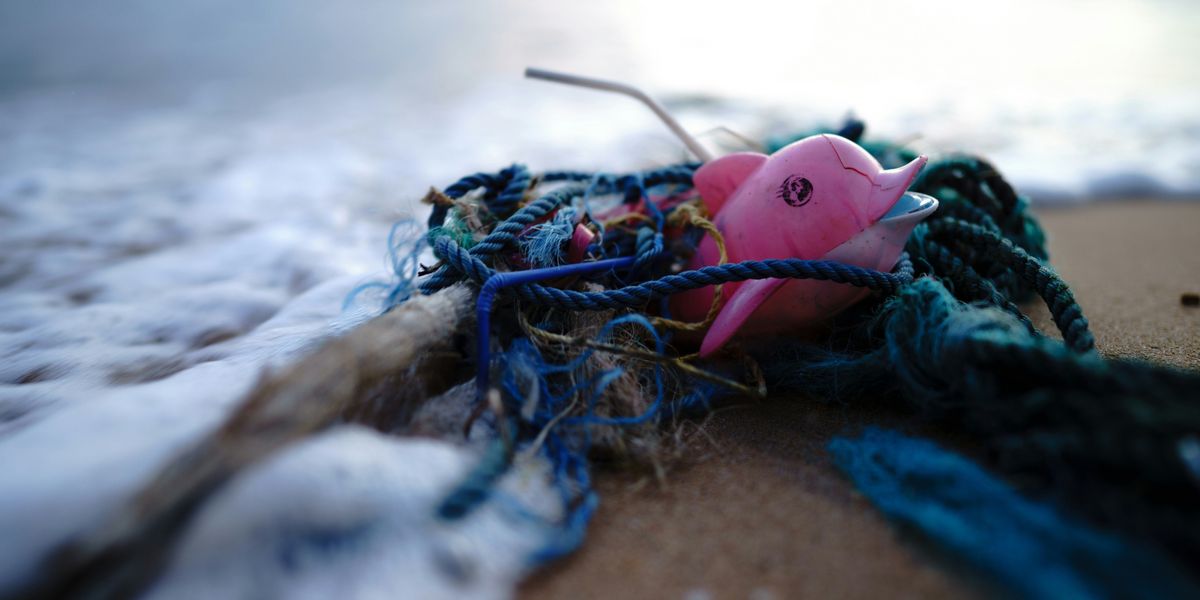global health threat
Plastic industry pushes for recycling as a solution to pollution crisis
The petrochemical industry claims to support a global treaty to curb plastic pollution but emphasizes recycling over production caps.
In short:
- Industry groups are promoting recycling targets and waste collection improvements as alternatives to capping plastic production.
- These proposals could cut global plastic pollution by 36% by 2050, but without a production cap, it's harder to achieve significant reductions.
- Industry influence over treaty negotiations is increasing, with substantial lobbying at recent sessions.
Key quote:
“Whether the treaty includes plastic production cuts is not just a policy debate. It’s a matter of survival.”
— Jorge Emmanuel, adjunct professor at Silliman University in the Philippines.
Why this matters:Recycling initiatives proposed by the petrochemicals industry while beneficial, are insufficient to tackle plastic pollution. A comprehensive approach, including production caps, is a more effective approach to achieve meaningful health and environmental benefits. For more read the op-ed by Pete Myers: We must determine which uses of plastic remain essential; eliminate those that aren’t; and design new materials to replace still essential plastics.
Tiny steps to reduce your exposure to microplastics
Microplastics, pervasive in our daily lives, can now be found in nearly every part of the human body, raising concerns about potential health risks.
In short:
- Microplastics, found in food, air, and water, are hard to avoid but reducing processed foods and using alternatives to plastic can help lower exposure.
- Plastic items like bottles and containers release more microplastics when heated; consider using glass for storage and preparation.
- Household dust and clothing shed microplastics; regular vacuuming with HEPA filters and mindful laundry practices can reduce inhalation risks.
Key quote:
“You’re not going to get to zero, but you can reduce your levels.”
— Tracey Woodruff, professor at the University of California, San Francisco
Why this matters:
Reducing microplastic exposure is important for long-term health, as research suggests links to inflammatory bowel disease and heart complications. Taking simple steps can mitigate risks while scientists work to understand the full impact of microplastics on human health. Read more: A plastic recipe for societal suicide.
Superbugs pose a greater threat than Covid, warns health expert
England's former chief medical officer claims that the rise of drug-resistant superbugs could present a crisis worse than the Covid pandemic.
In short:
- Prof Dame Sally Davies, the UK’s special envoy on antimicrobial resistance, emphasizes the urgent need to address superbug resistance, which she views as more severe than climate change.
- Drug-resistant infections, killing over 1.2 million people annually, could jeopardize modern medical procedures like surgeries and cancer treatments if not controlled.
- The UK government has launched a national action plan to curb the misuse of antimicrobials and foster new treatments and vaccines.
Key quote:
“It looks like a lot of people with untreatable infections, and we would have to move to isolating people who were untreatable in order not to infect their families and communities. So it’s a really disastrous picture.”
— Prof Dame Sally Davies, former chief medical officer
Why this matters:
The growing threat of antibiotic-resistant pathogens poses a potential global health crisis that could dwarf the effects of the Covid-19 pandemic. Read more: Scientists warn of disinfectant dangers.
Production cap is crucial to global treaty on plastic pollution, study suggests
Future models on plastic pollution suggest limiting the world's annual plastic production is necessary to mitigate its environmental impact.
In short:
- An upcoming international treaty aims to curb plastic pollution, with Rwanda and Peru proposing a 40% global production cut target by 2040.
- Plastic production needs to drop by 47% compared to 2016 levels to mitigate its harmful environmental effects, but even this ambitious target leaves significant pollution.
- Effective solutions require drastic lifestyle changes, shifting consumption habits and better waste management, particularly in underdeveloped regions.
Why this matters:
Tackling plastic pollution demands global cooperation and significant lifestyle changes. To achieve health and environmental goals, it's crucial to prioritize waste prevention and sustainable consumption. Read more: “Plastic will overwhelm us:” Scientists say health should be the core of global plastic treaty.
Opinion: Houston's petrochemical exports fuel Europe's growing plastics crisis
Europe grapples with escalating plastic pollution, driven by petrochemical imports from Texas. A recent report by Amnesty International shows how some of these imported petrochemical products are linked to environmental racism, and calls for more stringent rules to restrict the proliferation of polluting plastics.
In short:
- European shores are increasingly littered with plastic pellets, causing environmental emergencies and threats to marine life.
- Petrochemicals linked to human rights abuses in Texas are contaminating Europe's plastic supply, with European companies implicated.
- New EU rules and a potential UN plastics treaty aim to tackle the entire lifecycle of plastics, highlighting the need for global accountability in the industry.
Key quote:
"Combined with a tough new UN plastics treaty, the new EU directive could help turn the tide against plastics in Europe – which can’t come soon enough for the continent’s beaches, bottle-blighted rivers, and all those communities suffering at the hands of the plastics and fossil fuel industries."
— Alysha Khambay, report author and researcher at Amnesty International
Why this matters:
The involvement of European companies in harmful practices abroad shows the potential of stringent international regulations to safeguard health outcomes and mitigate widespread environmental damage. Read more: Texas has more chemical emergencies than any other state and they’re disproportionately affecting Latino communities.
Learn more about the UN plastics treaty talks happening in Ottawa this week.
Opinion: Rethinking plastic production for a healthier future
Delegates meet to reshape the global approach to plastic pollution at the UN treaty talks, highlighting industry influence and warning of greenwashing.
In short:
- The authors argue that the United Nations plastic treaty discussions in Ottawa need to steer clear of industry-promoted recycling myths and focus on substantive reductions in plastic production.
- They criticize the plastics industry for promoting continued reliance on ineffective recycling methods that fail to address broader environmental and health concerns.
- Global plastic output has surged, and unless robust international regulations are implemented, it is projected to double, exacerbating health and environmental crises.
Key quote:
"Instead of supporting cuts to plastic production, the U.S. has been mimicking the petrochemical and plastics industries’ talking points at the UN convenings, focusing on waste management and emphasizing failed plastics recycling and “circular” plastics."
— Judith Enck, president of Beyond Plastics and Pamela Miller, Alaska Community Action on Toxics.
Why this matters:
As the UN plastic treaty talks unfold, the authors urge focusing on reducing plastic production and eliminating harmful chemicals, not just for environmental sustainability but for global health and safety, particularly in vulnerable communities. Read more: Ending toxic threats to Alaska from plastics and petrochemicals.
Chemours and DuPont's knowledge of PFAS risks leads to UN intervention
A United Nations human rights panel has spotlighted a North Carolina PFAS plant for its environmental negligence, highlighting the ongoing production of toxic chemicals despite known health risks.
In short:
- The UN panel accuses Chemours and DuPont of continuing PFAS production in North Carolina, ignoring the chemicals' toxic impacts on health and the environment.
- Regulatory bodies, including the U.S. Environmental Protection Agency, are criticized for being overly influenced by these corporations, undermining efforts to regulate PFAS effectively.
- Despite corporate denials and claims of responsible manufacturing, the UN calls for global action to address the harmful effects of PFAS chemicals on communities worldwide.
Key quote:
“This does need to be a global fight. These are forever chemicals.”
— Emily Donovan, co-founder of Clean Cape Fear
Why this matters:
PFAS, a.k.a. "forever chemicals," persist in our global ecosystem and have had an adverse impact on global health since their inception. Scientists are scrambling for effective solutions to this ubiquitous toxic scourge and we are reminded that "forever" is a long time.



















